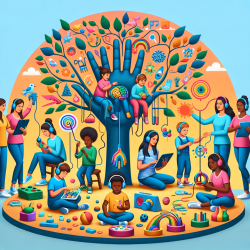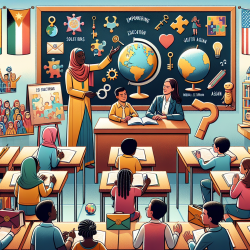Unlocking the Potential of Cardiac Rehabilitation for Children: Lessons from Latin America
As a speech-language pathologist dedicated to data-driven decisions, I am excited to explore how findings from a recent study on cardiac rehabilitation (CR) in Latin America can be applied to enhance therapy outcomes for children. The study, titled "Translation and Evaluation of a Comprehensive Educational Program for Cardiac Rehabilitation Patients in Latin America: A Multi-National, Longitudinal Study," presents compelling evidence on the benefits of structured educational interventions in CR settings. Let's delve into the key findings and explore how these insights can be harnessed to improve children's therapy experiences.
Key Findings from the Study
The study focused on translating and culturally adapting a comprehensive educational program, known as Cardiac College™, for CR patients in Latin America. The program aimed to improve knowledge, health literacy, self-efficacy, and health behaviors among participants. The results were promising, showing significant improvements in these areas, which were sustained six months post-program.
- Knowledge Improvement: Participants demonstrated a marked increase in disease-related knowledge, particularly in areas such as exercise, nutrition, and psychosocial risk.
- Health Literacy: The program significantly boosted health literacy levels, enabling participants to better understand and manage their health conditions.
- Self-Efficacy and Health Behaviors: Improvements in self-efficacy and health behaviors, such as increased physical activity and adherence to a healthy diet, were observed.
Implications for Speech-Language Pathology
While the study focused on adult cardiac patients, the principles of structured education and cultural adaptation have valuable implications for speech-language pathology, particularly in pediatric settings. Here's how practitioners can leverage these insights:
- Structured Educational Interventions: Incorporating structured educational modules into therapy sessions can enhance children's understanding of their therapy goals and processes. This approach can be tailored to suit individual needs and cultural contexts, ensuring relevance and engagement.
- Focus on Health Literacy: Just as health literacy was a key outcome in the study, fostering communication literacy in children can empower them to actively participate in their therapy. This involves teaching children to understand and express their needs effectively.
- Promoting Self-Efficacy: Encouraging children to set achievable goals and celebrate small victories can boost their confidence and motivation. This aligns with the study's findings on the importance of self-efficacy in driving positive health behaviors.
Encouraging Further Research
The study underscores the importance of evidence-based interventions and the need for ongoing research to refine and adapt educational programs. Speech-language pathologists are encouraged to explore similar research avenues, particularly in culturally diverse settings, to enhance therapy outcomes for children.
To read the original research paper, please follow this link: Translation and evaluation of a comprehensive educational program for cardiac rehabilitation patients in Latin America: A multi-national, longitudinal study.










